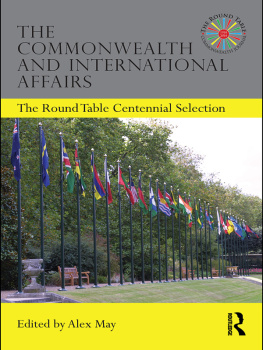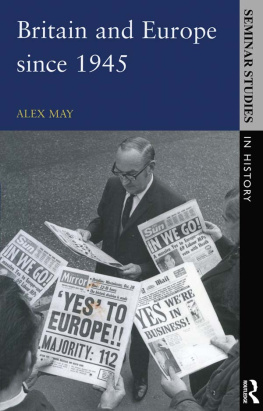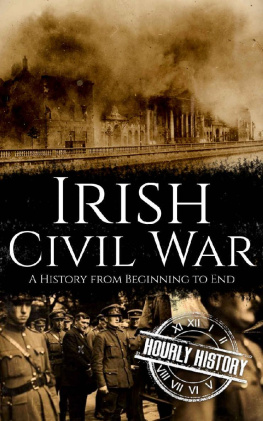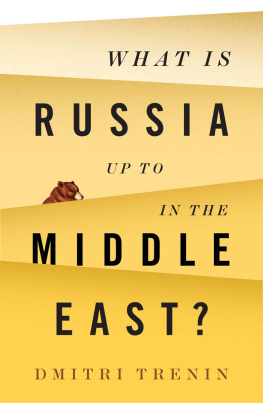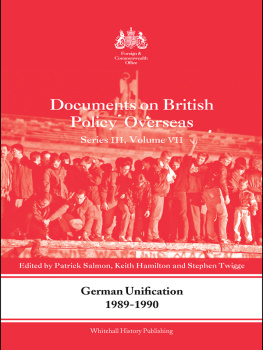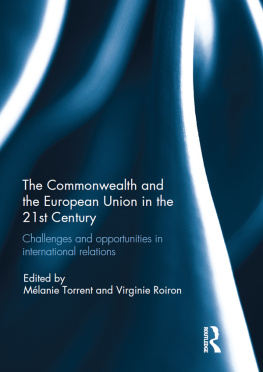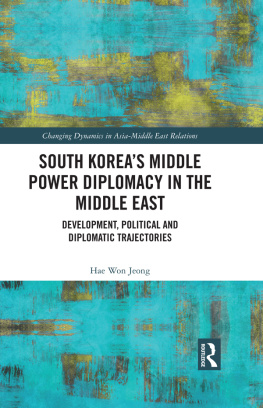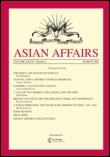The Commonwealth and International Affairs
The Round Table journal (now subtitled The Commonwealth Journal of International Affairs) first appeared in 1910. The journal carried a number of articles recognised both by contemporaries and by historians as highly influential in the making of Commonwealth policy, including constitutional reform in India, the independence of southern Ireland, the League of Nations mandates system and the United Nations trusteeship system, British policy in East Asia, the building of the Anglo-American alliance, appeasement, decolonisation, and the transition to a new, multipolar Commonwealth.
This book brings together excerpts from some of the key articles published over the last one hundred years and features leading figures including;
Lionel Curtis on Ireland, leading to the Anglo-Irish Treaty and the creation of the Irish Free State,
T.E. Lawrence on the Middle East, a key influence on post-1919 state creation in the Arab Middle East,
Philip Kerr on India, galvanizing attempts at constitutional reform in British India.
This selection provides a unique commentary on imperial/Commonwealth and international affairs and makes available to a new generation of scholars and students some of the articles now acknowledged as key influences in the evolution of British and Commonwealth policies.
This collection of essays is intended as a companion volume to The Contemporary Commonwealth: An assessment 19652009, edited by James Mayall, marking the centenary of The Round Table.
Alex May is Research Editor, Oxford Dictionary of National Biography, a project of the University of Oxford, and has been Honorary Secretary/ Treasurer of the Round Table since 1997.
Alex May, who is both the Secretary of The Round Table and its historian, is to be congratulated on assembling this selection of the best articles published in the journal over the past century. Both the anthology and his own incisive and informative Introduction provide a fascinating insight into the evolution of the Commonwealth idea, from its genesis in Milners Kindergarten to current preoccupations with civil society, multiculturalism, multilateralism, and democratic governance.
James Mayall Emeritus Sir Patrick Sheehy Professor of International Relations, University of Cambridge
This fascinating selection from the work of one of the earliest think-tanks is not only a valuable historical document but contains much useful advice for today.
Margaret MacMillan Warden, St Antonys College, Oxford
For consistent, well-informed, high quality, and perceptive commentary on Commonwealth affairs and Britains role in the world there is nothing to beat The Round Table. From its warnings of danger posed by German naval expansion prior to 1914 and the need to give the Dominions a say in policy-making if their military support was to be harnessed; through to understanding the aspirations of Egyptian, Arab, Indian and African nationalists; appreciating the changing nature of Commonwealth relations as Dominion sovereignty was conceded, republican status accepted, and an inter-governmental Secretariat and other organs created, The Round Table has usually been ahead of popular opinion. This amazingly interesting collection of articles selected from a centurys worth of lumpy bound volumes, with an introduction by the current secretary of the editorial moot, catches both the flavour of the fast-changing Commonwealth and the quality of the journal.
David McIntyre Emeritus Professor, University of Canterbury, Christchurch, New Zealand
a magnificent collection of great historic and contemporary significance
Don Markwell Warden, Rhodes House, Oxford
The Commonwealth and International Affairs
The Round Table Centennial Selection
Edited by
Alex May

LONDON AND NEW YORK
First published 2010
by Routledge
2 Park Square Milton Park Abingdon Oxon OX14 4RN
Simultaneously published in the USA and Canada
by Routledge
270 Madison Avenue, New York, NY 10016
Routledge is an imprint of the Taylor & Francis Group, an informa business.
This edition published in the Taylor & Francis e-Library, 2010.
To purchase your own copy of this or any of Taylor & Francis or Routledges collection of thousands of eBooks please go to www.eBookstore.tandf.co.uk.
2010 Alex May selection and editorial matter; individual contributors,
their contributions
All rights reserved. No part of this book may be reprinted or reproduced or
utilised in any form or by any electronic, mechanical, or other means, now
known or hereafter invented, including photocopying and recording, or in
any information storage or retrieval system, without permission in writing
from the publishers.
British Library Cataloguing in Publication Data
A catalogue record for this book is available
from the British Library
Library of Congress Cataloging in Publication Data
The Commonwealth and international affairs: the Round Table centennial
selection/edited by Alex May.
p. cm.
Includes bibliographical references and index.
1. Commonwealth countriesForeign relations. I. May, Alex (Alex
Charles) II. Round table
DA18.C513 2010
327.09171241dc22
2009049004
ISBN 0-203-85072-6 Master e-book ISBN
ISBN: 978-0-415-48523-4 (hbk)
ISBN: 978-0-203-85072-5 (ebk)
Contents
Preface
The early years of the twentieth century saw the founding of leagues and societies devoted to promoting the unity of the British Empire. Among them were the Victoria League and the League of the Empire in 1901, the Empire Day Movement and the Tariff Reform League in 1903, the Royal Colonial Institute and the Empire Press Union in 1909, the Over-Seas Club in 1910, and the Empire Parliamentary Association in 1911. Apart from loyalty to the Empire, the most notable characteristic was the sense of anxiety underpinning their activities. The South African War of 18991902 came as a shock to the British psyche. Settler soldiers of Dutch descent had defied the might of the British Empire. The United States had already overtaken Britain in economic power; and Germany was now building a navy to match its industrial and military strength, threatening British supremacy on the high seas. Only by drawing on the resources of the whole British Empire, so ran the argument, could Britain retain both the Empire and a place in the first rank of nations.
The most interesting and enduring of the organizations created in the febrile atmosphere of Edwardian England was the Round Table, founded in 1909. Its eponymous journal began the next year. The Round Table had its origins in Milners Kindergarten, the talented and impressionable young Oxford graduates recruited by Lord Milner and his successor Lord Selborne to help in the administration of the conquered territories in South Africa. Members of the Kindergarten were advocates of South African unification. They turned their attention also to the Empire. The Round Table was ostensibly a movement for the study of Imperial Britainthe metropole, the Indian Empire, the Dominions, colonies, and other dependencies. In reality it was a pressure group for imperial federation, or the creation of a new imperial parliament and government representative of all the peoples in the empire, not just those in Britain. The first goal was to unify the Dominions of Canada, Australia, New Zealand, and now South Africa. From the beginning, to its critics at least, the Round Table movement aimed at something like a super-state.

